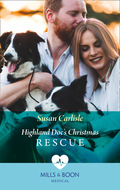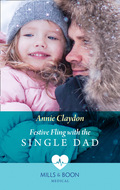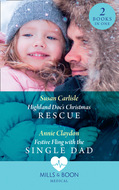Kitap dosya olarak indirilemez ancak uygulamamız üzerinden veya online olarak web sitemizden okunabilir.
Kitabı oku: «A Nurse In Crisis»
“Don’t ever think that I’m not here to help,” Marshall told her, his voice low and husky.
“Oh, Marsh, but I have problems at the moment,” she answered, feeling the relief as she let the words spill out. “It’s not fair to you, roping you into my life.…”
He had stiffened a little. She felt it as if they’d been pressed length to length, except that it was still just a finger, stroking her hand with an erotic subtlety she’d never imagined before.
“It’s not a question of being roped in, Aimee,” he said very carefully. “If you want me in your life, I want to be there. Is this about Friday night? Are you having regrets?”
The question was too sudden, too unexpected…and since her brother’s news, too accurate. Friday night had been utterly fabulous in itself, but as each hour went by the timing seemed more and more of a disaster.…
Dear Reader,
I always know that a book is working particularly well if a minor character starts demanding that I tell his or her story, too. It could be the hero’s brother or the heroine’s best friend. When I wrote Rebecca and Harry’s story in Her Passion for Dr. Jones, it was Rebecca’s father, Dr. Marshall Irwin, who demanded my attention.
Actually, Marsh wasn’t demanding that I tell his story; he’s not that kind of man. Successful and sure of himself, yes, but not arrogant or brash. Honorable, quietly passionate, gorgeous in a well-seasoned way…Of course I wanted to write about him! His wife had died years earlier while he was still in his thirties and his sense of loss had been so acute that he hadn’t even considered the possibility that he’d fall in love again. But I knew there would be someone out there for him when the time was right—someone with the same sense of family, who was at a similar stage in her own life.
Enter Aimee Hilliard. She’s warm, caring and not afraid of new experiences. She has three grown children whom she worries about. And when she thinks no one is around, she lets down her long hair and dances to rock and roll music in the dark. What on earth could go wrong between these two? Plenty, as they soon find out…
Lilian Darcy
A Nurse in Crisis
Lilian Darcy

MILLS & BOON
Before you start reading, why not sign up?
Thank you for downloading this Mills & Boon book. If you want to hear about exclusive discounts, special offers and competitions, sign up to our email newsletter today!
Or simply visit
Mills & Boon emails are completely free to receive and you can unsubscribe at any time via the link in any email we send you.
CONTENTS
COVER
LETTER TO READER
TITLE PAGE
CHAPTER ONE
CHAPTER TWO
CHAPTER THREE
CHAPTER FOUR
CHAPTER FIVE
CHAPTER SIX
CHAPTER SEVEN
CHAPTER EIGHT
CHAPTER NINE
EPILOGUE
COPYRIGHT
CHAPTER ONE
‘IS IT serious, Dad?’ Rebecca Irwin asked quietly.
Marshall met his daughter’s intelligent blue-eyed regard across the reception desk of the GP surgery where they both worked. He rested his hands lightly on the papers there and took a moment to think about her question.
He hadn’t expected it. Not right at this moment. The busy Sydney medical practice was quiet as its staff had left for the day. The computer hummed. Its screen-saver of furry yellow and black caterpillars crawling across a carpet of green leaves was now the most colourful thing in the waiting room.
Practice nurse Aimee Hilliard had been the last person to go, just a minute earlier, leaving only Marshall and his daughter. Marsh planned to phone Aimee tonight, and was quietly confident that she’d be pleased to hear his voice after hours. It wouldn’t be the first time he’d made such a call, although he was taking things slowly…
‘I don’t know yet,’ he answered Rebecca, as a pleasant and surprisingly physical warmth began to grow inside him. ‘I’m starting to think it might be. I’d…’ He hesitated, having to struggle to break down his natural reserve. ‘I’d like it to be, actually.’
Rebecca gasped. ‘Dad! What on earth—?’
She seemed appalled. Marshall felt his scalp tighten. She was staring at him, her mouth open and her eyes wide. In a matter of seconds, something had gone seriously wrong with this conversation.
‘Let’s get this clear,’ she said carefully. ‘I’m talking about Mrs Deutschkron’s test results.’
‘Mrs…?’
‘There.’ She gestured. ‘Under your hand. The pathology reports, and hers is on top. I saw the name a few minutes ago when Bev handed them to you.’
‘I haven’t looked at them yet,’ Marshall confessed, his scalp tightening even further. ‘I hadn’t even realised that hers was on top.’
‘So what were you talking about?’ Rebecca accused.
He was hot, now, as guilty and self-conscious as a child caught stealing lollies. ‘Nothing important.’
But she wasn’t buying it. She ticked his recent statements off on her fingers, one by one. ‘You don’t know yet. You’re starting to think it might be. You’d like it to be.’
‘I can see why you hoped it wasn’t Mrs Deutschkron’s test results,’ he joked heartily.
‘Dad…You meant Aimee, didn’t you?’
‘Yes.’ He nodded briefly. ‘Because I thought that you did.’
There was a rather long silence. ‘Been wondering, actually,’ Rebecca finally said.
She was standing by the door, running her fingers up and down the edges of the wooden Venetian blinds in an irritating manner. Marshall found it irritating, anyway. It was permissible to be irritated with grown-up, married and newly pregnant daughters who asked probing questions at the wrong moment.
Only, he remembered, she hadn’t been asking about his feelings for Aimee Hilliard at all. He’d made the wrong assumption because of the direction in which his own thoughts had been moving, and as a result he now found himself having to talk about their relationship—which wasn’t a word he liked these days because people always said it as if it had such a very significant capital R at the beginning of it—long before he was remotely ready to. So perhaps it was himself he was irritated at?
Yes, undoubtedly.
‘Yet you haven’t said anything,’ Rebecca was now accusing him gently.
‘Because there isn’t anything to say,’ he burst out, goaded beyond endurance.
Unfairly, of course. This was his own fault! Rashly, he ploughed on. That was the danger when you were reserved by inner nature and upbringing. Once you did open your mouth, you didn’t know when to stop!
‘Rebecca, please, don’t put this under that mental microscope of yours!’
‘Microscope?’
He ignored her. ‘I wish the subject hadn’t come up. I don’t know what’s happening. I don’t know how she feels. I’m very rusty at this—’
‘What did you mean, “microscope”?’ Ominous. Her voice wasn’t quite steady.
‘Bad word choice.’
‘You think I—’
‘No! No, Rebecca.’
‘You know that all I care about is your—’
‘Yes, yes, I do know that.’ Marsh steadied himself, remembering too late that her pregnancy, which wasn’t making her nauseous or even particularly fatigued, was making her rather fragile and volatile emotionally at the moment. Both he and Harry, his son-in-law, had been trying unsuccessfully to get her to slow down just a little.
‘I’m sorry,’ he apologised. ‘This is all completely my fault. Can you accept that I’m not ready to talk about it yet, and that when I am—if I am, if there’s anything concrete to say—you’ll be the first to know?’
She nodded brightly. ‘Of course, Dad.’
But the straight line of her mouth seconds later told him that she hadn’t quite forgiven him for the microscope thing, or…perhaps more importantly…for the fact that something new and potentially important was going on in his life and he hadn’t said a word.
‘I’d better head off now,’ she said, a little too abruptly. ‘Harry was going to see a patient on his way home, and I told him I’d get there first and get dinner on. He’ll be worried if I’m not in evidence.’
‘Don’t tire yourself out with elaborate cooking, Becca.’
‘Frozen quiche and garlic bread, and a bag of salad greens,’ she summarised dryly.
‘Good girl!’
‘See you tomorrow.’
A smile came and went too quickly, leaving a frown in its place, and then she’d gone. He could hear her youthful, energetic footsteps scraping on the half-dozen concrete steps that led down to the street. He listened until they faded.
She was too protective of him, that was the trouble. It had been that way for years, since her mother had died when Rebecca had been just fifteen years old. That was thirteen years ago now. Thirteen years…
For a long time, his grief for Joy had been overwhelming, and it had been Rebecca who’d held the family together, helped him to cater for ten-year-old Simon’s needs, nurtured both of them in a hundred different ways.
Three years ago, he’d finally felt ready to consider marriage again, but his choice—made more as a matter of expediency than love, he could now see—had been disastrous. He’d proposed to his live-in housekeeper, who was ten years his junior, but, instead of politely turning him down, she’d acted as if it had been a case of sexual harassment and he’d been badly shaken by his misreading of her.
Rebecca had been furious on his behalf. At one point he’d had to talk her out of storming around to Tanya’s new flat and demanding back the jewellery he’d given the woman.
‘The jewellery isn’t the issue, Rebecca!’ he’d had to argue urgently. ‘She’s more than welcome to it as some sort of compensation if my behaviour was really so offensive.’
‘Oh, of course it wasn’t!’
‘It’s my own judgement that I’m doubting.’
‘You should be doubting the mental state of the entire female sex over the age of thirty,’ Rebecca had muttered darkly. ‘I am!’
Marshall sighed. He loved his daughter’s passion, and her strong responses, and he knew that his son-in-law had fallen for those same qualities. There were times, however, when it might have been more…convenient…if Rebecca bore less of a resemblance to an angry lioness protecting the pride.
Absently, he looked down at the pathology reports still resting beneath his fingers. That was where this had all started a few minutes ago. Rebecca had wanted to know if Mrs Deutschkron’s prognosis was serious. He picked up the sheet of paper and studied the details, and had the answer to his daughter’s question a moment later—an answer which suddenly dwarfed his concern over Rebecca’s attitude towards his blossoming new relationship with Aimee Hilliard.
It was serious. Far more serious than he’d thought it would be. Hilde Deutschkron had had exploratory surgery last Thursday for suspected cancer, but prior to that she’d seemed relatively fit and with few complaints about her symptoms. He’d had every expectation that any growth found by the surgeons would turn out to be localised and easy to deal with, effectively meaning a permanent cure.
Yet the results provided by Southshore Hospital’s pathology department were unequivocal—cancer of the liver, with the primary tumour not located, which meant a spread of cancer throughout her system. No hope of a cure or of long-term survival. At best, the possibility of chemotherapy, which would prolong the patient’s life for several months. Many people, in these circumstances, made the choice to have no treatment at all.
As yet, she wouldn’t have been told any of this. Usually, it was the surgeon’s job, but since he’d known this patient for such a long time he would do what he’d done once or twice before and phone the surgeon to suggest that he tell Mrs Deutschkron himself. It wasn’t something any doctor looked forward to, but Marshall felt that it would come best from him.
And he couldn’t shake it off, as he usually managed to. Hilde Deutschkron had been a patient at this practice since long before he’d started here, and that had been over twenty years ago. Her three children had been delivered by old Dr Rattigan, who was now retired. Her husband had been a patient here, too, until his death of heart failure six years ago.
Still, perhaps he might have shaken it off more easily if it hadn’t come as such a surprise…
At home, an hour later, the big house where he now lived alone seemed too big, ridiculously big for one man. Simon was still studying in the United States. He’d met an American girl and they were now seriously involved. It seemed all too likely that he’d make his home there permanently.
Rebecca and Harry lived just a short drive away in Surry Hills, but even with the prospect of overnight visits from darling little grandchildren in the not too distant future—and, good heavens, it was difficult to adjust to the idea that he’d be a grandfather soon—he didn’t need all this space. Should he sell and move somewhere smaller?
One of life’s big chances, a decision to make, as Hilde Deutschkron would have to do soon, only her decision was much more grave.
He picked up the phone and dialled Aimee’s number. What would she say if she knew that he could key in the eight digits off by heart now? Would she be pleased? Did she know his number, by any chance?
She answered on the first ring. Her voice was as cool and fluid and sweet as ever, but he hadn’t expected to hear it quite so soon, and was startled into speaking more abruptly than he’d intended.
‘Aimee? It’s Marshall. I’m sorry, I was going to suggest we go out for a coffee later on. We talked about something like that on Sunday, didn’t we? But I wouldn’t be good company tonight, I’m afraid. The news on Hilde Deutschkron wasn’t good…’
‘Oh, no!’
He gave her the details, then added, ‘And, well, as I said, I just wouldn’t be good company.’
‘That’s fine. Of course. I understand completely. Perhaps you should go for a walk or a jog or something.’
‘Good idea,’ he agreed, and a few moments later he’d put down the phone.
‘Or, Marshall, would it help if I—?’ Aimee began.
Too late. She heard a click in her ear, and then the metallic trill of the dial tone. He’d hung up without hearing her belated addition. She took the receiver from her ear and just sat there in her silent house for several long minutes, trying to argue herself out of an absurd disappointment, trying to take herself back to the mood of the weekend they’d just spent together at the ski resort of Perisher in the Snowy Mountains.
Two couples had had to pull out of a trip some friends of Marshall’s had planned, and he’d invited Aimee to join him in taking up the two spare rooms, already booked and paid for. They’d had a thoroughly wonderful time on the slopes and with Marshall’s four friends. Simmering below this, as yet unacknowledged, had been a stirring of the senses she’d forgotten about, hadn’t felt since…when? Her twenties? She already had a strong inkling about its importance.
Marshall had felt it, too. She was quite sure of that. They’d both sensed the unfurling of a physicality which had been dormant in each of them for a long time. But the six-hour journey back to Sydney after the weekend was over, in the four-wheel drive the six of them had rented, had broken the mood somewhat. Everyone had been tired, and the other two women, Penelope and Sandra, had been getting on each other’s nerves.
At her home, Marshall had helped Aimee to carry in her luggage, saying to her quickly at the door, ‘Can’t stop. Geoff’s on a short fuse.’ He’d taken her hands between his and she’d loved the warm, engulfing feel of his touch. Then he’d said something very quick and sketchy about ‘doing something together’ very soon.
His swift, tender kiss had brushed her cheek and the corner of her mouth, lasting only a moment, yet more than twenty-four hours later it still seemed to tingle on her skin.
I’m falling in love with him, Aimee realised. I’m really, truly falling in love with him.
It felt wonderful, and at the same time very, very frightening. She was fifty and he was fifty-one. They both had grown-up children, including each of them a daughter who would soon make them grandparents for the first time. Perhaps, after all, it was good that he’d cried off tonight with that brief phone call. She really had to keep her feet on the ground about this!
For the next hour and a half, Aimee did just that. She did sensible things, like ironing blouses and teatowels, and cleaning the cupboard under the sink. She made herself a mushroom omelette for dinner, and washed the dishes immediately afterwards. She rang her son Thomas, who was doing three months of field research near Cairns, and her daughter Sarah, who was having a very difficult time with her first pregnancy, which had now reached the end of the second trimester.
Sarah fretted over the phone, ‘My friend Louise says she never felt like this. And she thinks I look huge, but the ultrasound showed it’s not twins.’
‘When’s your next appointment?’ Aimee asked her daughter.
‘Next week.’
‘Write down all your concerns so you remember everything you want to ask the doctor. And if you’re really worried, give him a call tomorrow and ask if he can see you sooner.’
It was sensible advice, received with thanks from Sarah.
Then Aimee spoiled it all by pouring herself a glass of white wine—only a small one—letting down her long hair, turning off all the lights except the stained-glass lamp on the end table and dancing with her eyes closed to a compilation tape that Sarah had made for her, featuring Elvis Presley, Roy Orbison and the Rolling Stones.
How old was fifty, anyway? Not old at all! Younger than Mick Jagger. And she’d just spent the weekend skiing, for heaven’s sake!
Then the doorbell rang. It might, in fact, have been ringing for a while. There was no point at all in listening to the Rolling Stones unless you listened to them loud!
Half-empty wineglass in her hand and silver-white hair flowing down her back, she went to answer it, almost hoping that it would be grumpy Gordon Parker from across the street, complaining about the music. Her lounge-room window was open and it was possible that the sound carried that far, although there was a thick screening of trees and shrubs in the way.
Gordon was only a year or two older than she was, but he was always on about ‘young people today’, and she always felt highly defensive on behalf of Sarah and Thomas and her youngest son William, who weren’t ‘lazy and rude and undisciplined’ at all.
Here I come, Gordon Parker, and I’m going to vigorously defend my right to listen to ‘Paint It Black’ in the privacy of my own home at eight o’clock in the evening, although I may agree to turn down the volume a notch or two!
She opened the door.
‘Uh…’ Marshall Irwin began awkwardly.
Aimee gasped, and it was probably fortunate that she didn’t have any pockets in her old black cotton and Lycra leggings to stuff the wineglass into, slurp of Chardonnay included. ‘Marshall! Come in…’
He looked achingly good, incredibly masculine and a lot better than Mick Jagger. He’d obviously been jogging, though he was only slightly out of breath. A dark blue T-shirt clung closely to a sinewy and nicely muscled frame. Loose black twill-weave running shorts showed off legs that were no strangers to exercise. They were brown, knotty, strong and roughened by dark hair. It was only two weeks until Sydney’s well-known ‘City to Surf’ race, which he entered every year.
In the surgery, he usually wore glasses. Aimee liked the aura of experience and wisdom which the rectangular wire frames lent to his face. At the moment he wasn’t wearing them and she could see his eyes, and it was starting to be a distinct possibility that she liked those even better than the glasses. They were blue, like the blue of willow-pattern china, steady and twinkling and…uncertain.
‘Should I?’ he said. ‘You look as if you’re…’ He stopped.
Having a party? Oh, hell, this was embarrassing! Lonely widow, dancing her heart out in the dark. Secret women’s business, indeed!
‘I’m not,’ Aimee said. ‘At least, I was, but…’
‘Sorry?’
‘Please, come in!’ She practically dragged him through the doorway by both hands, with the wineglass pressed between her fingers and his. ‘I was…dancing, that’s all.’
‘Paint It Black’ came to an end, and ‘Pretty Woman’ came on instead. Following her down the hallway, Marshall laughed. ‘Dancing? All by yourself?’
‘I know. It’s—’
‘Delightful! It’s absolutely delightful, Aimee,’ he repeated softly, and before she knew it he’d taken the wine-glass from her hand and plonked it down on the sideboard, then whirled her to face him. He took her hands in his and began rocking along with her to the jaunty, driving beat. He was good at it, unselfconscious and naturally attuned to the rhythm. ‘Do you do it often?’
‘No!’ she denied frantically, then added, opting for greater honesty, ‘But I often feel that I should. When I do it, it’s so nice. Not really a lonely feeling, dancing alone, because it’s so exhilarating, and I usually phone Sarah or someone afterwards, and anyway William only left home at the beginning of the year…’
‘Did he join in?’
‘No, he laughed at me! But in a nice way. He thinks the Rolling Stones are dreadfully old-fashioned. He likes Radiohead and Smashing Pumpkins and Powderfinger.’
‘I’m impressed at the way you can reel off the names!’
The home-made tape came to an end, making the last few notes of the song wobble before they cut off, and the silence was too sudden. They both stood in the centre of the room like boats beached by a low tide.
‘Ah-h-h!’ Aimee said to break it, lifting her hair up onto her head to cool her neck. She was more breathless than Marshall had been after his jog.
‘I had to come,’ he said, his voice suddenly low and serious.
She looked up at him, alarmed.
‘No,’ he hastened to answer her. ‘Nothing’s happened. But when I told you I wouldn’t be good company because of feeling low over Mrs Deutschkron’s prognosis, I realised…I can already tell this isn’t going to come out right!…that that was exactly why I should want to see you, and why I did want to see you. Damn!’
‘Marshall?’
‘I was right. It hardly sounds like a compliment, does it? That I was down, so I wanted to inflict it on you and added your house to the route of my evening jog. Oh, but, Aimee, I don’t want to waste any more time on explanations! I don’t! This is what I want…’
He pulled her into his arms slowly, with grace and care, as if it was something he hadn’t done in a long time but had no doubts about the rightness of doing now.
Coming up against his chest, still breathless, Aimee had no doubts either. Her body and her heart were responding more strongly than she’d thought they had the power to do. Her heart was pounding, in fact, and her breathing was light and fluttery. They were both a little sweaty and damp, both dressed in soft clothing that clung intimately.
But before she had time to map the places their bodies touched with such electrifying effect, he was kissing her. Not the rather courteous, old-fashioned press of his lips to the corner of her mouth that he’d given her on Sunday evening, but a real, honest-to-goodness, hot, passionate smooch.
It felt…wonderful! And very quickly much more than a smooch. A…A…There wasn’t a better word in any language she knew.
Oh, stop thinking about it, Aimee!
She did, and just gave herself to the endless moment instead. Slowly, his arms came fully around her, one hand resting against her hip at first, then sliding across to lazily trace the curve of her rear, still satisfactorily taut and shapely beneath the close-fitting leggings.
Marsh’s other hand had crossed her back and kneaded her shoulder, and she had to arch and stretch her neck up to reach him with her own mouth, creating a strangely pleasant feeling that she’d topple backwards if he didn’t have her so tightly and preciously enclosed in his arms.
His face was a little rough. His body was firm, and still hot from his run. His mouth was confident, as if now that he’d jumped in at the deep end he’d remembered that he was good at this.
And he was good at it! She hadn’t realised until now that kissing was a talent like any other, and some people had that talent in spades.
He had a better talent than she did, too, of keeping track of a conversation, because when he finally broke away to ask, ‘Do you understand that it’s a compliment, Aimee?’ she didn’t have a clue what he was talking about. Of course a kiss was a compliment!
‘I mean the fact that I needed to come,’ he explained, after seeing her confused expression. ‘It wasn’t planned. I was jogging and I was heading in this direction, and it suddenly just wasn’t possible not to come down your street and front up at your door and demand a cup of tea.’
‘You haven’t done that yet.’
‘Can I do it now? This business of Mrs Deutschkron is still eating at me.’
‘Oh, Marshall!’ She reached up and pushed a stray lock of dark hair, thickly threaded with grey, back from his forehead. ‘Of course it is! I’m so sorry, and here I am, dancing away like a maniac.’
She stroked her fingers down his jaw and neck, felt the beating of his blood briefly, then let them rest softly on his shoulder as she searched his face.
‘Don’t apologise,’ he said. ‘You hardly know her, and probably know nothing of her history.’
‘No, I don’t.’
He opened his mouth as if to launch into a story, then shook his head. ‘We won’t talk about it tonight. That’s not why I came. I really just wanted…’ he paused, then looked straight down into her eyes ‘…to be with you, Aimee.’
‘I’m glad,’ she managed breathlessly. ‘Come through, and I’ll make the tea.’
The mood had changed, but it was just as pleasant. They sat at the big kitchen table, talked about all sorts of things and drank their tea, warming their legs and hands in front of an old-fashioned electric fire.
It was the kind, at least fifty years old, that was shaped like a fireplace and had fake coals lit from beneath to make them ‘glow’, and was so ugly and silly that it had acquired the status of an antique by this time, and Aimee was perversely fond of it. It had once belonged to her grandmother. She liked it for practical reasons, too. A July night in Sydney could be chilly.
Marshall seemed to appreciate it. He stuck his bare legs out until they were so close to the heat that they practically sizzled, and when he finally looked at his watch and took note of the time his jaw dropped. ‘It can’t be ten!’
‘I know,’ she agreed. ‘But it is. I’ll drive you home.’
‘No…’
‘Yes. Please.’
‘I won’t be annoying and argue the point,’ he conceded. ‘A ride home does sound a lot more pleasant than a jog, now that my legs are so warm and relaxed.’
They went out through the lounge room side by side, and there wasn’t quite enough room as they passed the sideboard. He bumped it, and the glasses and china inside it rattled.
So did the half-empty wineglass she’d put down on the top of it two hours ago.
‘Oops.’ He reached a hand out to steady the glass and noticed the wine still sloshing inside. There was a tiny pause, then he said lightly, ‘You never finished it.’
‘It doesn’t matter,’ she answered him. But it came out just a little too hastily, and then she only made it worse by adding self-consciously, ‘I don’t often drink alone.’
‘Oh, no, I wasn’t suggesting…’ He didn’t finish the sentence, and there was a tinge of awkwardness in the atmosphere.
Why did I say that? Aimee scolded herself inwardly. I don’t often drink alone, but saying it only made it sound as if I did.
The moment passed as she reached the front door and opened it to let in a draught of chilly air.
‘Brr!’ Marshall said. ‘Definitely too cold for running shorts!’
They talked about the weather for the whole car journey to his place. Only five minutes between their two houses, so it wasn’t so disastrous a subject, but Aimee still felt an odd discomfort and disappointment. Was she still smarting over that silly exchange about the wine?
Surely not! What was it, then? It had something to do with the wine.
Outside Marshall’s gracious old house his kiss was brief and he didn’t ask her in.
Driving home alone, Aimee probed at what she felt in the same way that she might have probed at a sore tooth with her tongue, and finally concluded in her mind. It’s still early days. That’s what rattled me about him noticing the wine. For a moment there, he did wonder, and it’s early days in what’s going on between us. We’ve both lived full lives before this.
She thought about her twenty-six year marriage to Alan. It had been a relatively happy one. She’d entered into it with too many stars in her eyes, of course, at the age of twenty. Then they’d weathered some disappointments, disagreements, coolnesses, ongoing differences in outlook that they’d never really addressed. That sort of thing changed a woman’s perspective, influenced the person she became.
Neither of us comes without baggage, Aimee realised. We both have children. Previous marriages. Past grief. Complicated finances. It wouldn’t take much, at this stage, to make the whole thing seem wrong, or just too hard.
Letting herself into her house, she saw that the ‘on’ light was still glowing on her sound system. She turned it off. No more dancing tonight. Time to go to bed.








